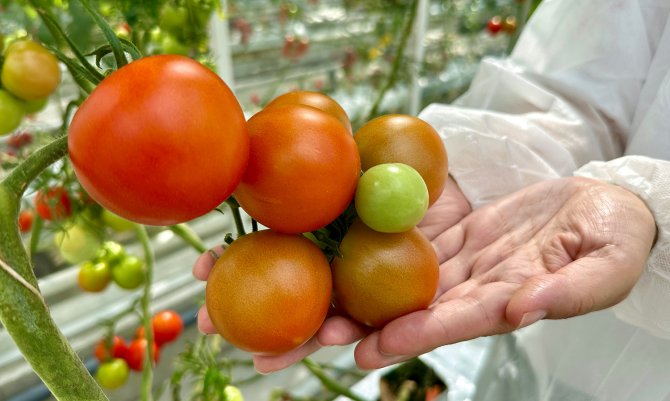
Salty tomatoes, salty potatoes
Excess salt in the soil hinders the growth of tomato and potato plants. However, if you manage to create good, salt-tolerant varieties, the flavour can be surprisingly delicious.
Drought, rising sea levels in coastal areas, and excessive use of fertilisers are increasing problems and lead to salty soils. Our current crops - for example tomato and potato - are not adapted to high soil salinity. This can cause major yield losses, for instance in tomato producing countries like Italy and Spain. Rumyana Karlova, assistant professor at the Laboratory of Plant Physiology, is investigating how plants cope with this stress, so that tomato and potato cultivation can remain viable on those soils and growers can choose which combination of characteristics is best for their situation and practice.

What happens to tomatoes if they grow on soil that is too salty?
'Just as too much salt is toxic for people, it is also toxic for plants. The plants will absorb less water and nutrients from the soil, and they grow more slowly and produce fewer or smaller fruits. Yet, there are mechanisms in plants that allow them to deal with this stress. For example, inside every plant cell, there is a vacuole, a small bladder filled with fluid, isolated by a membrane layer. Some plants efficiently put excess salts into the vacuole, where they can do less harm. There are special transporter proteins in the membrane between the cell and the vacuole that regulate this transport .'
Where do you stand now in the research on salt stress in tomatoes?
'We want to know which genes are involved in the processes in the cell to deal with salinity stress. With that knowledge, breeders can, in turn, adapt tomatoes in a much more targeted way. We are studying 140 varieties, in which we also expect differences in dealing with salt stress. We are using several replicas of each type, so these are trials with more than a thousand plants.
In this kind of research, you can identify the main genes involved in salt stress responses/adaptation in tomatoes. The trick is then to find the genes that turn on many other genes, the so-called master regulators. We hope to eventually have about ten genes left that can be used in breeding.'
Does cultivation on saline soil matter for flavour?
'Yes, we do expect it to. We are working with a research group in Italy, and they told us that the most flavourful tomatoes come from Sicily, where they grow using brackish water. So moderate salt stress-resistant tomatoes already exist, but if we know the genes involved in the adaptation we can use them for even more varieties in more places.'
Can you apply this to other crops as well?
'We are also researching salt tolerance in potatoes. Like tomatoes, these belong to the nightshade family. And potatoes are also sensitive to salt stress. Yet the differences are significant. Besides, with tomatoes, you eat the fruits; with potatoes, the underground tubers. These are in direct contact with the salty water in the soil. So you will have to figure out a lot again. But I definitely believe that with smart selection and molecular breeding, we can start exploiting the potential of plants even better because their adaptability is unprecedented, both on an evolutionary time scale of 500 million years -since the advent of land plants- and their own life cycle. After all, plants cannot run away while their environment is constantly changing. We are only just beginning to unravel that potential of plants to adapt to changing conditions'